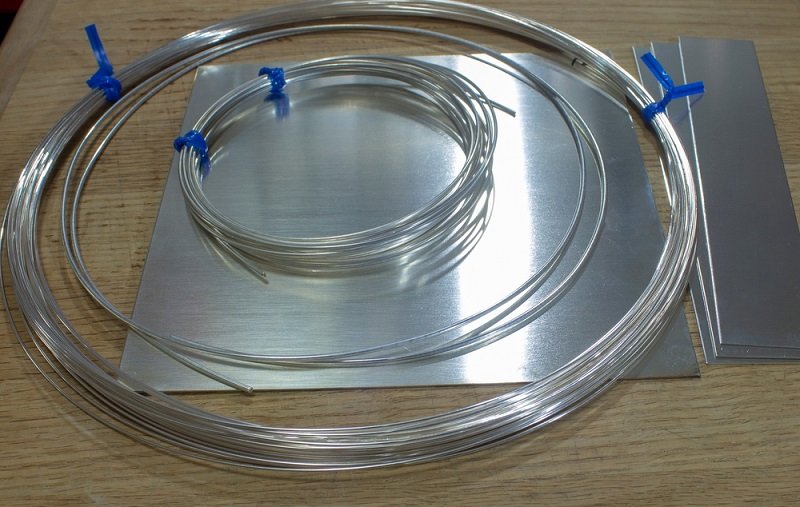For those new to working with precious metals, just finding them can seem like a major source of stress. Fortunately, there are a lot of ways to source your metals and a lot of different places to get them. It just depends on your budget and the amount of work you’re willing to do.
So, let’s dive in and I’ll help you find a way to get the metals you need for your next project.
It’s All About Spot Pricing
If you’re new to precious metals, you need to be aware that prices fluctuate daily and every dealer out there is going to have similar prices on the low end. There’s just no room for “cheap” gold or silver when they both have a high intrinsic value.
Shopping around for basic metal supplies like sheets and wire is rarely going to save you any money. I suggest just picking a supplier and sticking with them unless you need to get something in more quickly.
Anything that’s being sold significantly under spot (with one exception listed below) is a scam. Always. No one is going to intentionally lose money on precious metals.
Jewelry Suppliers and Metal Dealers
At the top of the list are reputable metal dealers and jewelry suppliers. Most of them will have any metal, in any configuration, you might need them in. That’s especially handy for some components, like heavy-walled tubing, that are extremely time-consuming and material intensive when created at home.
It’s also the best place to get wire, sheet, and other basic forms of material without having to worry about anything.
What You Might Run Into
The main problem you’ll run into is simple: the majority of these companies are focused on jewelry supply and commercial sales. If you’re only used to dealing with Amazon, you may be in for a bit of a surprise.
To put it bluntly: these businesses primarily exist to supply other businesses. Many weren’t even part of the retail market until recently. So… customer service probably isn’t what you’re used to, especially in this day and age. Most of the “horror” stories I’ve read have been from people buying small amounts of material from enormous commercial sellers with expectations built on Amazon Prime.
That’s not how it works.
It Might Take Longer Than You Expect
That said, the only issue I’ve ever found is that orders may take some time to actually leave the building. I recommend using a different avenue if you need the material immediately and having a bit of patience. 2-5 business days until shipping is standard unless you went with some form of expedited shipping.
That won’t be every order, of course. I’ve had some go out on the same day or the next day, but it’s more variable than dealing with retail outlets.
Some of the recommended suppliers are:
- Rio Grande– A large supplier based in New Mexico. They’re one of the most commonly used by hobbyists and have a relatively easy-to-use website. Rio Grande is my usual source for silver and gold, as well as smaller tools, but they’re a bit expensive. Rio Grande has more complaints from hobbyists than most, but as far as I can tell it’s just because more of us use them.
- Monster Slayer– One of the most commonly recommended alternatives to Rio. They’re a great supplier, but their website is pretty old school. Prices are usually a bit cheaper than Rio, but when dealing with commodities “shopping around” is essentially meaningless. It’s beads, stones, and findings where you may be able to save a few bucks.
- Cooksongold– A UK-based supplier for anyone living across the pond. UK laws and controls on precious metals are different than those in the US and it lets those based in the UK avoid the insane shipping charges for bringing items across the Atlantic.
Depending on where you’re based, you may need to look around. Lists of suppliers are usually pretty easy to find, such as this list for Australians.
There are definitely a lot more than the companies mentioned above if you want to dig. My shop is focused on fabrication: we only buy sheet metal, wire, and casting grain when it comes to metals.
Findings, beads, and other supplies are where you can save money by shopping around. If you just need sheet metal or wire then a jewelry supplier is going to give you the best bang for your buck.

Online Retail Platforms
Amazon
Amazon is great for a lot of things, especially if you’re price-conscious. It’s not my favorite source for jewelry metals, but it will get much-needed supplies to finish a project to my mailbox in 2-3 days.
The premium for purchasing through Amazon is high. At current prices (~$25/oz of silver), you’ll pay a bit more than double purchasing wire through my usual emergency supplier than I would if I made an order from a proper supply company. It will arrive a few days earlier in most cases, without having to pay for expedited shipping.
Etsy
Etsy is similar but doesn’t have the advantage of Prime Shipping. eBay also has supplies, but in general, the site is a bit harder to navigate and has more scams than most retail places.
I use both for consumables (ie: burrs, solder, sandpaper) but only order metals in a pinch.
That said, sometimes you can’t find what you need in time through the usual channels. In that case, they’re an attractive option. Just be aware you’re not going to save money buying through them. There is virtually no instance where real silver or gold alloys are going to be cheaper through retail suppliers than commercial suppliers.
Bullion Suppliers
If you have a rolling mill and a decent torch, then bullion can be a good choice. I’ve used it occasionally in the shop, but rarely seek it out on purpose. The main issue is that the majority of silver sold as bullion is fine silver (99.9%+ purity) rather than sterling silver.
Alloying sterling silver isn’t hard, but it does require time and a lot of heat. You’ll also need a precise scale, as a few fractions of a percentage point off can render your final product as something that doesn’t quite test out as sterling.
The premium usually works out to just a couple of dollars per troy ounce more than the spot value of the metal. It’s probably the cheapest way to get silver into your shop if you meticulously avoid adding labor time into your calculations.
I use Apmex, but the suppliers are pretty much interchangeable. You can also get bullion from places like Etsy, but there’s a lot more buyer beware involved. It’s riskier just picking them up from a reputable supplier without a real cost advantage.
Hardware Stores
Silver is a no-go at hardware stores, obviously, but they’re a great source for brass and copper material. Both are useful in the workshop, and are great metals in their own right if you’re planning on using them for jewelry.
At local stores, you can usually find brass rods and sheeting, and copper wire and sheeting. I keep a ¼” brass rod around at all times for making expedient tooling and 24g copper wire to bind things.
If your medium is wire-wrapping?
You’re in luck. Copper wire sold for electrical use is always high purity and cheaper than wire sold for jewelry. You may need to anneal it first, but the minimal amount of time involved leaves them still coming out ahead.
Hardware stores also have a ton of the other stuff you may need at a moment’s notice, so get familiar with what you can find at your local stores.
Bead and Jewelry Stores
Bead and jewelry stores sometimes carry precious metals. In my experience, it’s usually in the form of fittings, beads, and possibly chains. I have yet to see one selling sterling silver wire or sheet, and the prices are high.
That can make all of the difference. While I’m all for supporting small businesses, it’s kind of disconcerting to see how high prices can get in private shops. I’d suggest buying other things as a form of support, commodity prices are already high for precious metals.
Big box craft stores, such as Michael’s or Hobby Lobby, sometimes carry precious metals. I’ve bought delicate sterling silver chains at the latter a few times. The prices weren’t great but it was fast.
Smaller brick-and-mortar places are harder to find these days, and they vary greatly depending on location and who is running the business.
Thrift Store Scrap Metal
Scrap silver isn’t too hard to find and it’s the only way I know of to consistently get metal for under spot value. It can be a hit-or-miss affair and requires a good knowledge of what you’re looking at.
Silver was a common item for forks, spoons, and knife handles in the past. You’ll occasionally run into small ornamental items made of silver as well, things like bells for instance.
Bigger thrift stores (think Goodwill or the Salvation Army) have systems to sift out any precious metals before they reach the store. They function on a warehouse system, designed to catch expensive items before they make it to the floor.
On the other hand, private estate sales and smaller thrift shops can be a treasure trove. I recommend spending some time familiarizing yourself with hallmarks and maker marks before you begin.
A lot of silverware is actually worth way more than spot if you’re patient enough to find a buyer.
Get there early. There are dedicated resellers who will hit these places on a regular basis and know exactly what to look for. With that said, a keen eye can land you some incredible deals on precious metals.
- Online rock and mineral club for collectors of all levels!
- Find community with like-minded rock and mineral enthusiasts.
- Monthly Giveaways!
- Free Access to Entire Digital Library of Products (current and future products)*


